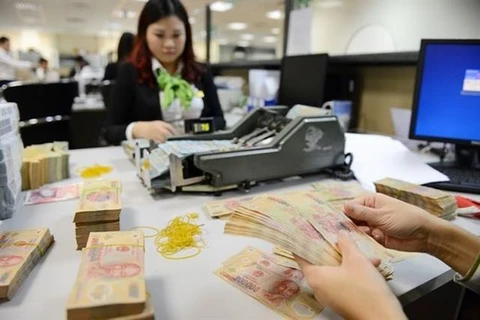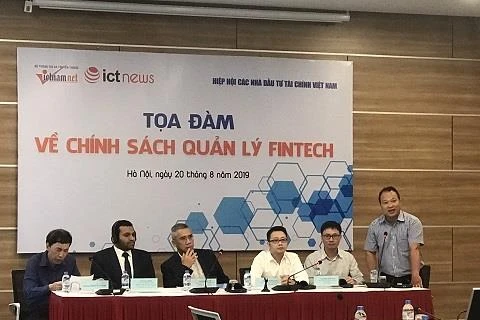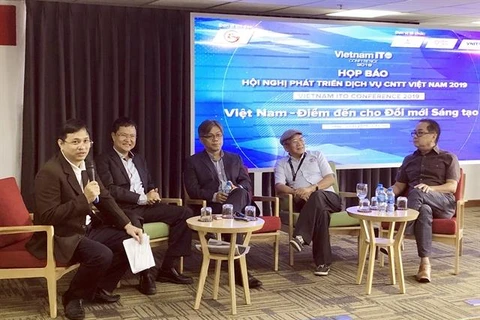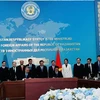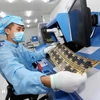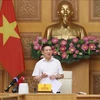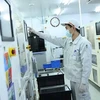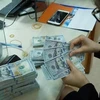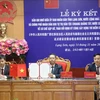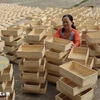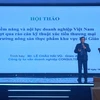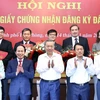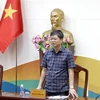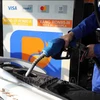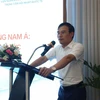Hanoi (VNS/VNA) - Representatives of the blockchain industry in Vietnam have asked for a ‘sandbox’ for the technology while meeting with Government agencies at a conference on in Hanoi on September 18.
The conference, held by the Ministry of Justice (MoJ), included different dialogues on the legal framework relating to the development of blockchain technology in Vietnam.
The sandbox concept, which was developed in a time of rapid technological innovation in financial markets, is a framework set up by a financial sector regulator to allow small-scale, live testing of innovations by private firms in a controlled environment under the regulator’s supervision.
In the region, some sandbox models have been launched successfully in Singapore, Malaysia and Japan, according to Vuong Quang Long, CEO of Tomochain, which last year issued 50 million Tomo tokens worldwide, drawing in US$8.5 million from 50 domestic and international organisations.
As there is no legal status for blockchain yet in Vietnam, Long’s Tomochain is headquartered in Singapore.
Agreeing with Long, Dao Minh Tung, CEO of the VCC digital asset exchange (VCCE) told Viet Nam News: “The country should have a legal system that helps develop digital asset trading in Vietnam and helps local investors feel safe and secure with the service.”
“While no exchange can be registered in Vietnam, the local digital asset trading traffic is always in the global top five.”
“Such a situation has created many fake exchanges and put investors at risk of losing money,” Tung added.
As the result, he also set up VCCE in Singapore and now it is a secure exchange for local investors with a Vietnamese website and 24/7 hotline.
Hoang Manh Khoi, CEO of Stably, an American platform which is building the blockchain economy through the stable coin of USDS, said: “A sandbox will help enterprises in Vietnam to mobilise their capital and attract more customers with their own coins.”
Not only digital assets and coins, Chris Berg, Senior Research Fellow at RMIT University’s Blockchain Innovation Hub defined blockchain as a consensus over the contents of a shared programmable ledger through the use of economic incentives where code and protocols replace rules, while smart contracts replace traditional ones.
Berg added blockchain technology possesses high security features which can prevent network security risks better than the old technology in terms of hacks, thus receiving special attention of many firms.
Previously, experts from global law firm Duane Morris LLP thought Vietnam has the potential to become the next blockchain hub so a conducive, practical legal framework for crypto assets could further assist in growth.
According to an MoJ representative, seeing the use of blockchain in financial technology, banking, industrial production, service, supply chain and education, it would like to collect comments from the blockchain community to build the framework.
Acknowledging the fact that many Vietnamese start-ups set up in Singapore or elsewhere instead of Vietnam due to the lack of legal framework for development, Phan Chi Hieu, deputy minister of Justice said: “The MoJ will review all blockchain-related matters to make a legal framework to submit to the Prime Minister.”
Last year, Deputy Prime Minister Vuong Dinh Hue asked the MoJ to hasten and complete the legal framework for managing virtual currencies in Vietnam./.
The conference, held by the Ministry of Justice (MoJ), included different dialogues on the legal framework relating to the development of blockchain technology in Vietnam.
The sandbox concept, which was developed in a time of rapid technological innovation in financial markets, is a framework set up by a financial sector regulator to allow small-scale, live testing of innovations by private firms in a controlled environment under the regulator’s supervision.
In the region, some sandbox models have been launched successfully in Singapore, Malaysia and Japan, according to Vuong Quang Long, CEO of Tomochain, which last year issued 50 million Tomo tokens worldwide, drawing in US$8.5 million from 50 domestic and international organisations.
As there is no legal status for blockchain yet in Vietnam, Long’s Tomochain is headquartered in Singapore.
Agreeing with Long, Dao Minh Tung, CEO of the VCC digital asset exchange (VCCE) told Viet Nam News: “The country should have a legal system that helps develop digital asset trading in Vietnam and helps local investors feel safe and secure with the service.”
“While no exchange can be registered in Vietnam, the local digital asset trading traffic is always in the global top five.”
“Such a situation has created many fake exchanges and put investors at risk of losing money,” Tung added.
As the result, he also set up VCCE in Singapore and now it is a secure exchange for local investors with a Vietnamese website and 24/7 hotline.
Hoang Manh Khoi, CEO of Stably, an American platform which is building the blockchain economy through the stable coin of USDS, said: “A sandbox will help enterprises in Vietnam to mobilise their capital and attract more customers with their own coins.”
Not only digital assets and coins, Chris Berg, Senior Research Fellow at RMIT University’s Blockchain Innovation Hub defined blockchain as a consensus over the contents of a shared programmable ledger through the use of economic incentives where code and protocols replace rules, while smart contracts replace traditional ones.
Berg added blockchain technology possesses high security features which can prevent network security risks better than the old technology in terms of hacks, thus receiving special attention of many firms.
Previously, experts from global law firm Duane Morris LLP thought Vietnam has the potential to become the next blockchain hub so a conducive, practical legal framework for crypto assets could further assist in growth.
According to an MoJ representative, seeing the use of blockchain in financial technology, banking, industrial production, service, supply chain and education, it would like to collect comments from the blockchain community to build the framework.
Acknowledging the fact that many Vietnamese start-ups set up in Singapore or elsewhere instead of Vietnam due to the lack of legal framework for development, Phan Chi Hieu, deputy minister of Justice said: “The MoJ will review all blockchain-related matters to make a legal framework to submit to the Prime Minister.”
Last year, Deputy Prime Minister Vuong Dinh Hue asked the MoJ to hasten and complete the legal framework for managing virtual currencies in Vietnam./.
VNA


